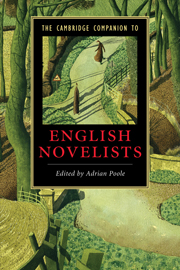Book contents
- Frontmatter
- Introduction
- 1 Daniel Defoe
- 2 Samuel Richardson
- 3 Henry Fielding
- 4 Laurence Sterne
- 5 Frances Burney
- 6 Jane Austen
- 7 Walter Scott
- 8 Charles Dickens
- 9 William Makepeace Thackeray
- 10 Charlotte Brontë
- 11 Emily Brontë
- 12 Elizabeth Gaskell
- 13 Anthony Trollope
- 14 George Eliot
- 15 Thomas Hardy
- 16 Robert Louis Stevenson
- 17 Henry James
- 18 Joseph Conrad
- 19 D. H. Lawrence
- 20 James Joyce
- 21 E. M. Forster
- 22 Virginia Woolf
- 23 Elizabeth Bowen
- 24 Henry Green
- 25 Evelyn Waugh
- 26 Graham Greene
- 27 William Golding
- Guide to further reading
- Index
12 - Elizabeth Gaskell
Published online by Cambridge University Press: 28 March 2010
- Frontmatter
- Introduction
- 1 Daniel Defoe
- 2 Samuel Richardson
- 3 Henry Fielding
- 4 Laurence Sterne
- 5 Frances Burney
- 6 Jane Austen
- 7 Walter Scott
- 8 Charles Dickens
- 9 William Makepeace Thackeray
- 10 Charlotte Brontë
- 11 Emily Brontë
- 12 Elizabeth Gaskell
- 13 Anthony Trollope
- 14 George Eliot
- 15 Thomas Hardy
- 16 Robert Louis Stevenson
- 17 Henry James
- 18 Joseph Conrad
- 19 D. H. Lawrence
- 20 James Joyce
- 21 E. M. Forster
- 22 Virginia Woolf
- 23 Elizabeth Bowen
- 24 Henry Green
- 25 Evelyn Waugh
- 26 Graham Greene
- 27 William Golding
- Guide to further reading
- Index
Summary
“every little, leetle, particular about yourself, and your concerns . . . are most welcome to me . . . down to the uninteresting in general basons of tapioca you have at lunch” / Henry James's description of the novelist simply as one 'upon whom nothing is lost' suggests a complex ambition for the fiction of his century - the impulse not only to observe, but also to amass, record, preserve, recover, redeem. Such impulses - intensified, perhaps, by the experiences of loss accompanying accelerating social change - lie close to the heart of the nebulous mass of fictional conventions we call 'realism'. A shape begins to form in the mist if we read the fiction of Elizabeth Gaskell (1810-65) with an eye for such impulses. If the literary colossi of her generation seem in danger of overshadowing her on some fronts, her commitment to the capture, recording, and recovery of the texture of everyday human existence remains exemplary. The fifth chapter of Cranford (1853), 'Old Letters', recalls how an elderly acquaintance, who took the failure of his bank 'with stoical mildness', nevertheless “worried his family all through a long summer's day because one of them had torn . . . out the written leaves of his now useless bank-book . . . the corresponding pages at the other end came out as well, and this little unnecessary waste of paper . . . chafed him more than all the loss of his money.” Thus, a wistful chapter about loss begins with a comical exploration, registered in the very stuff of life, of an all too human urge to save and to spare in the face of inevitably changing times: 'Envelopes fretted his soul terribly when they first came in'; 'Even now . . . I see him casting wistful glances at his daughters when they send a whole inside of a half-sheet of note paper, with the three lines of acceptance to an invitation, written on only one of the sides' (C, 41).
- Type
- Chapter
- Information
- The Cambridge Companion to English Novelists , pp. 193 - 209Publisher: Cambridge University PressPrint publication year: 2009



